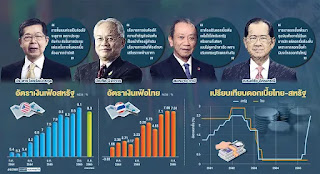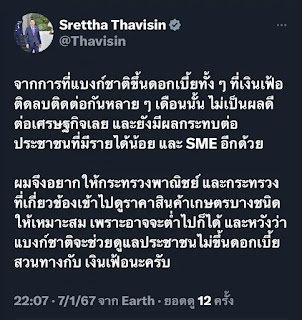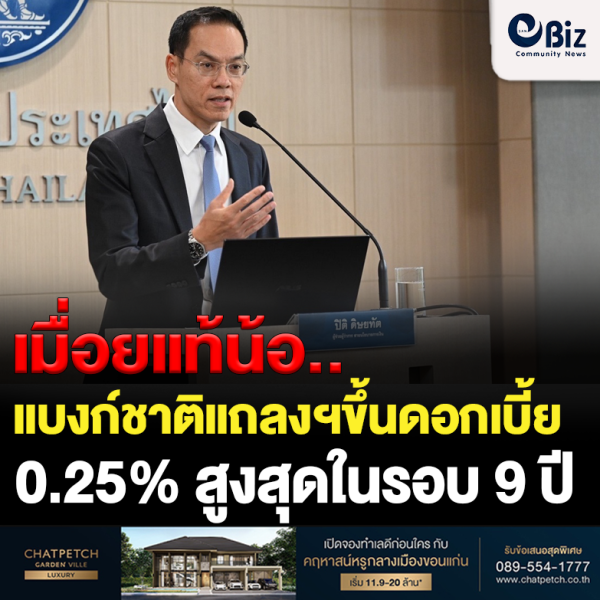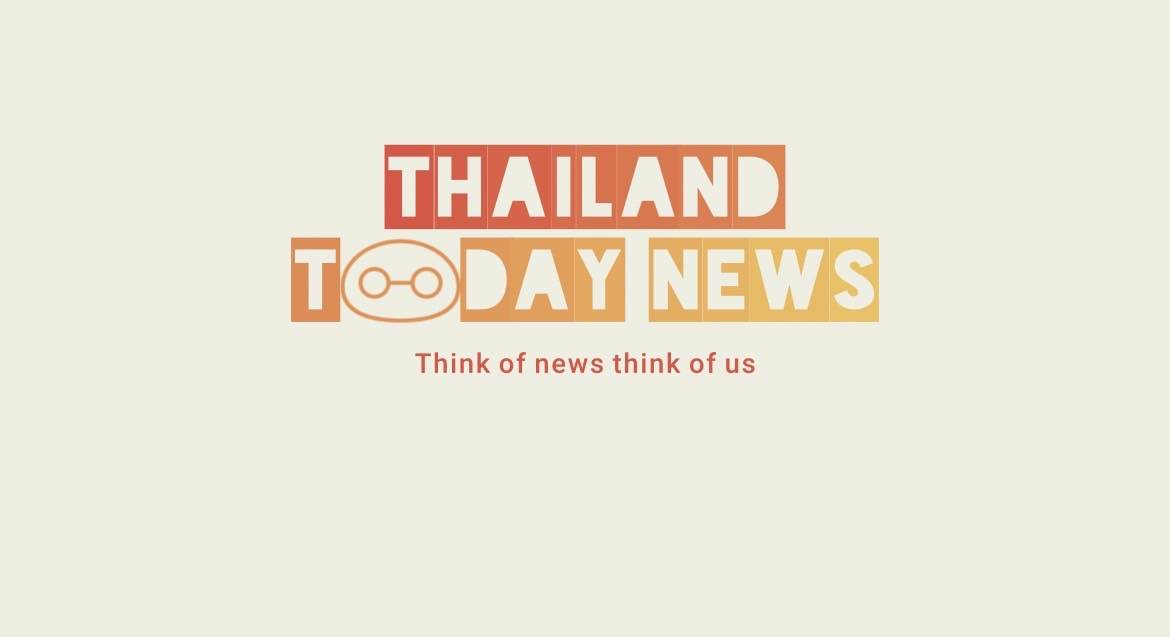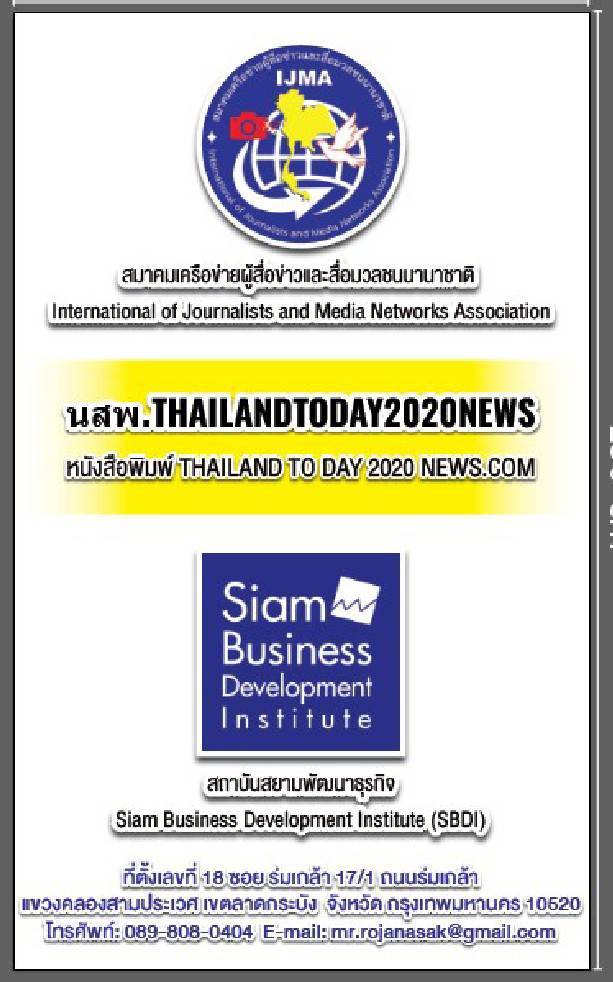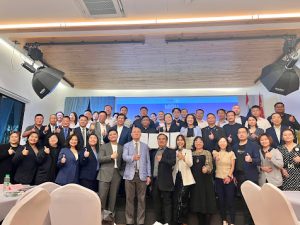
ธปท.แจงเหตุดอกเบี้ยแพง-ยันนโยบายการเงินไม่มาผิดทาง
นายปิติ ดิษยทัต ผู้ช่วยผู้ว่าการสายนโยบายการเงิน ธนาคารแห่งประเทศไทย (ธปท.) ในฐานะเลขานุการคณะกรรมการนโยบายการเงิน แถลงถึงการดำเนินนโยบายการเงินที่ผ่านมา โดยชี้แจ้งว่าคณะกรรมการนโยบายการเงิน (กนง.) จึงทยอยปรับขึ้นดอกเบี้ยนโยบายอย่างค่อยเป็นค่อยไป ไม่ได้ปรับขึ้นตามทิศทางของธนาคารกลางประเทศเศรษฐกิจหลักทันที แต่ไทยจะฝืนกระแสเงินโลกไม่ได้นาน จึงต้องเริ่มขึ้นดอกเบี้ย ในช่วงที่จีนประกาศเปิดประเทศ ซึ่งแบงก์ชาติคาดหวังไม่ต่างจากรัฐบาลว่าการเปิดประเทศของจีนจะช่วยให้เศรษฐกิจไทยกลับมาฟื้นตัวเร็วขึ้น การทำนโยบายการเงินก็เช่นกันที่ต้องมองผลระยะข้างหน้า ไม่ใช่ขณะนี้
ส่วนการที่เงินเฟ้อติดลบแต่ทำไมไม่ลดดอกเบี้ย สาเหตุคือจากปัจจัยเฉพาะที่ไม่ยั่งยืน การลดดอกเบี้ยไม่สะท้อนกำลังซื้อ เพราะเงินเฟ้อลดลงจากปัญหาอุปทาน การผลิตที่คลี่คลายลงในบางสินค้า ประเมินว่าเงินเฟ้อจะติดลบยาวถึงเดือน ก.พ.นี้ และค่อย ๆ เพิ่มขึ้นอยู่ที่ 1-2% ซึ่งอยู่ในกรอบภายในสิ้นปี 2567 โดยธปท.รับฟังจากทุกภาคส่วน จากรัฐบาล กระทรวงการคลัง นายกรัฐมนตรี นักวิเคราะห์ที่ให้มุมมองมีประโยชน์ ซึ่งมีหลายปัจจัยต้องคำนึงทั้งระยะสั้นระยะยาว ได้ทบทวนเสมอว่ามีจุดยืนสอดคล้องอย่างที่ควรจะเป็นหรือไม่ พร้อมทั้งยืนยันไม่มีการประชุม กนง.นัดพิเศษ เพราะตัวเลขเศรษฐกิจที่ออกมาเป็นปกติ ตลาดการเงินทำงานปกติ ไม่มีเหตุผลเรียกการประชุมนัดพิเศษ
อย่างไรก็ตาม กนง. พร้อมที่จะปรับนโยบายการเงินให้สอดคล้องกับสถานการณ์ทางเศรษฐกิจ ไม่ได้มีการยึดนโยบายจนไม่มีการปรับเปลี่ยน ซึ่งที่ผ่านมาการปรับขึ้นดอกเบี้ยก็เป็นไปอย่างค่อยเป็นค่อยไป สะท้อนการชั่งน้ำหนักและพิจารณาปัจจัยทั้งหมด ทั้งในระยะสั้นและระยะยาว โดยจุดยืนที่ กนง. อยากให้มีในภาวะการเงินปัจจุบัน คือ อยากให้มีการสมดุล และเป็นกลาง ไม่ฉุดรั้งเศรษฐกิจ และธปท.เปิดรับฟังความเห็นจากทุกฝ่ายที่เกี่ยวข้อง โดยเฉพาะรัฐบาลและกระทรวงการคลังได้หารือกันตลอด และนำมาทบทวนเสมอว่าได้ดำเนินนโยบายถูกต้องแล้วหรือไม่ ซึ่งยืนยันว่าขณะนี้ ธปท.ดำเนินนโยบายไม่ผิดทางแน่นอน และพร้อมปรับจุดยืนนโยบายให้เหมาะสม หากแนวโน้มเศรษฐกิจและเงินเฟ้อเปลี่ยนไปจากที่ประเมินไว้
ทางด้าน น.ส.สุวรรณี เจษฎาศักดิ์ ผู้ช่วยผู้ว่าการสายกำกับสถาบันการเงิน ธปท.กล่าวถึงกรณีที่นายเศรษฐา ทวีสิน นายกรัฐมนตรีและรมว.การคลัง ให้ความเห็นว่าดอกเบี้ยไทยสูงเกินไป และกำไรธนาคารพาณิชย์สูง ท่ามกลางความเดือดร้อนของประชาชน ว่า ประเด็นนี้ ธปท. จะต้องพูดคุยหารือกับธนาคารพาณิชย์อย่างใกล้ชิดขึ้น ห่วงกลุ่มเปราะบาง ซึ่งได้ขอให้ธนาคารพาณิชย์ระมัดระวังการขึ้นดอกเบี้ยเงินกู้รายย่อย โดยขอให้ขึ้นดอกเบี้ยต่ำกว่าสินเชื่อประเภทอื่น ๆ ซึ่งการส่งผ่านดอกเบี้ย MRR อยู่ที่ 49% ลดลงจากในอดีตที่ 58% ถือว่าน้อยกว่าหลาย ๆ ประเท ที่เฉลี่ยอยู่ที่ 79-100% สำหรับส่วนต่างอัตราดอกเบี้ยเงินกู้และเงินฝากของธนาคารพาณิชย์ที่มีเสียงวิพากษ์วิจารย์จากประชาชนส่วนหนึ่งว่า ธนาคารให้ดอกเบี้ยเงินฝากน้อย แต่เก็บดอกเบี้ยเงินกู้สูง หลายคนผ่อนไม่ไหวนั้น เรื่องนี้ต้องพูดคุยหารือกับธนาคารพาณิชย์เรื่องกำไร โดยเฉพาะดอกเบี้ยเงินฝากออมทรัพย์ แต่ปัจจุบันหลายธนาคารเริ่มขยับเงินฝากมากขึ้น ทั้งเงินฝากประจำและเงินฝากออมทรัพย์ดิจิทัล โดยรายได้ดอกเบี้ยสุทธิ (NIM) ช่วง 9 เดือนอยู่ที่ 2.95% สูงขึ้นก่อนโควิด-19 แต่ยังไม่ได้สะท้อนค่าใช้จ่ายอีกหลายรายการในการประกอบธุรกิจ ทำให้ต้องเข้าไปดูว่ามีการไม่มีประสิทธิภาพในการดำเนินธุรกิจหรือไม่ ซึ่งจะสามารถปรับลดส่วนต่างตรงนี้ได้หรือไม่
นายสักกะภพ พันธ์ยานุกูล ผู้อำนวยการอาวุโส ฝ่ายตลาดการเงิน ธปท. กล่าวว่า ยืนยันว่า การทำงานของตลาดทุน ตราสารหนี้เอกชน ยังทำงานปกติ ส่วนเรื่องความเสี่ยงการชำระคืนจะครบกำหนด 1 ล้านล้านบาทในปีนี้ ส่วนใหญ่ครบกำหนดในไตรมาสแรก มองว่าปัญหาการไม่สามารถชำระคืนได้เป็นปัญหาเฉพาะรายเฉพาะบริษัท แต่มั่นใจไม่ขยายไประบบตลาดการเงิน และผลกระทบหุ้นกู้กลุ่มเสี่ยงต่อกองทุนรวมมีน้อยมาก ในส่วนของการพิจารณามาตรการ LTVในภาคอสังหาริมทรัพย์นั้น ต้องชั่งน้ำหนักระหว่างผู้กู้ ผู้มีส่วนได้ส่วนเสีย ถ้าดูสถานการณ์จะเห็นว่าผู้กู้สัญญาแรกที่ต้องการบ้านหลังแรกจริง มาตรการดังกล่าวไม่ได้กระทบ ในทางกลับกันจะเป็นการส่งเสริมมากกว่า ขณะที่จำนวนการโอนกรรมสิทธิ์สูงกว่าค่าเฉลี่ยในอดีต สินเชื่อผู้ประกอบการปรับตัวดีขึ้น ภาพใหญ่คงต้องมาดู แต่การเห็นสภาพปัจจุบัน ความจำเป็นต้องดูความสมดุลต่าง ๆ ด้วย

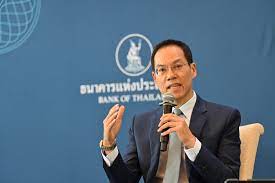

The Bank of Thailand (BOT) explained that interest rates and monetary policy were not in the wrong direction.
Mr. Preep Disayatat, Assistant Governor, Monetary Policy Group, Bank of Thailand (BOT).As Secretary-General of the Monetary Policy Committee (MPC) announced the recent implementation of monetary policy, indicating that the Monetary Policy Committee (MPC).As a result, the central bank has gradually raised its policy rate, not immediately following the central bank’s direction. However, Thailand will not be able to resist global money flow for long. Therefore, interest rates should be started when China announces the country’s opening of the country is expected to speed up economic recovery. It is also the case that monetary policy should be viewed in the future, not now.
Inflation is negative, butWhy not cut interest rates? This is due to the non-sustainable nature of interest rate cuts that do not reflect purchasing power, as inflation has eased from supply problems, production on some goods.This year and gradually increase to 1-2 percent, which is in the range by the end of 2014 by the Bank of Thailand.The government, Finance Ministry, Prime Minister and many analysts who have long-term viewpoints have to consider whether their positions are consistent or not. The MPC also confirmed that there is no special meeting because the economic indicators are normal.
How?Go for it is. They are ready to adjust their monetary policy in line with the economic situation. The MPC’s stance is that they will gradually increase interest rates. In the present financial situation, the Bank of Thailand (BOT) wants to be balanced and neutral.The Ministry of Finance and government have been discussing the matter with all relevant parties, especially the Ministry of Finance and has always reviewed whether the policy has been implemented properly. This confirms that the Bank of Thailand (BOT) is now in charge.The policy stance is definitely wrong, and the policy stance will be adjusted accordingly if the economic outlook and inflation change from previous estimates.
on the side of Ms.Suwannee Jesadasak, Assistant Governor, Financial Institutions Supervisory Service of the Bank of ThailandDiscuss the case of Mr. Setha Thaweesin, Prime Minister and Minister.The Finance Ministry commented that Thai interest rates were too high and commercial bank profits were high amid the public’s woes. More closely should be discussed with commercial banks, concerned about the vulnerable groups, who have asked commercial banks to be more cautious in raising interest rates on retail loans, which are 49% lower than in the past, compared to 58% and 79-100% lower than in many countries. For the loan and deposit spreads of commercial banks, which have been criticized by some people for their low interest rates and high interest rates, many banks have had to discuss profits with commercial banks, especially savings deposits. Including fixed deposits and digital savings deposits. Net interest income (NIM) for 9 months was 2.95% higher than before Covid-19, but still did not reflect many other business expenses. Therefore, it is necessary to see if there is any inefficiency in the business.
Mr. Sakkapop Phanyanukul, Senior Vice President, Financial Markets Department of the Bank of Thailand (BOT). Said that the private equity market is still functioning normally, while the repayment risk will reach THB1 trillion this year. Most of them are due in 1Q09, but they are not expected to expand into the financial system and the impact of these debentures on mutual funds is minimal. LTVs in the real estate sector have to weigh between borrowers and stakeholders. If you look at the situation where first-time homebuyers want first-home buyers, this measure is not affected. In other words, ownership transfers are higher than the average in the past. The need to look at the balance as well.
